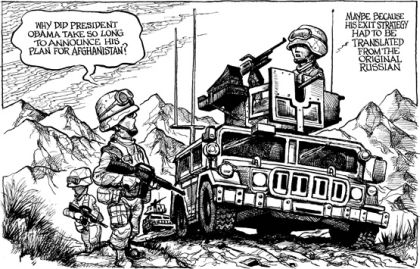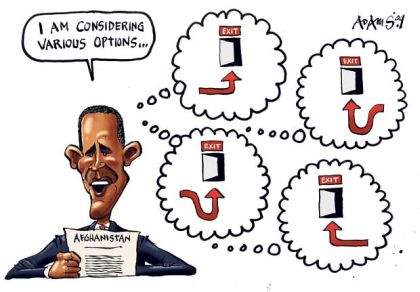
[The Economist, U.K.]
Rossiyskaya Gazeta, Russia
NATO Still
'Clueless' About What to Do Next
"No
matter how well Afghan soldiers are equipped, no matter how modern the weapons
being put into their hands, most will run away during their first military
encounter. No, they aren't bad fighters. They just don't understand what, why
and from whom they are protecting."
By Vladislav
Vorobyev
Translated By Yekaterina Blinova
December 4, 2009
Russia - Rossijskaya Gazeta - Original Article (Russian)
There's no doubt that
increasingly, the members of the NATO alliance are coming to a conclusion - the
time for the painless use of delaying tactics has nearly run out. To find real
answers to the most complex issues, a meeting in Brussels on Thursday and
Friday brought together foreign ministers from the 28 member countries.
Washington, for example, demands that NATO become a more aggressive
organization. But the truth is that up to now, not all of its members understand that
this isn't about Russia anymore.
For a long time, NATO
intentionally acted with extreme languidness "on all fronts."
Languidly, it discussed various ideas for a common European defense. Languidly,
it reacted to the desire of the George W. Bush Administration's desire to build
missile silos in close proximity to Russian borders. Languidly, it helped the
U.S. fight the Taliban in Afghanistan.
But life outside the walls of
NATO headquarters in Brussels is becoming more dynamic every day. And almost
unbelievably: with their initiatives, the U.S. and Russia have awakened NATO.
But what has taken place over the past three days shows that NATO has yet to
grasp why it has been woken. At the same time, it still doesn't have a clue
about what to do next.
There are a great number of
questions and problems that demand immediate solutions. And so far there are no
answers at all. On Thursday, NATO foreign ministers will decide what to do with
Afghanistan. And on Friday, for the first time after the events in South
Ossetia [Georgia], the NATO-Russia
Council will be conducted at the foreign ministers level.
True, even on Tuesday,
Russia's ambassador to NATO, Dmitry Rogozin, wasn't
sure that the Council would be held. Rogozin announced that the Canadian
delegation had decided to block any decisions that could be adopted on Friday
with Russia. It's possible that Rogozin was deliberately raising the
temperature on the problem, realizing once again that NATO isn't ready for a
serious dialogue. The wake-up call turned out to be extremely effective.
Already on Wednesday, after several consultations with NATO Secretary General
Anders Fogh Rasmussen,
Rogozin said: "We have found resolutions to all complex problems, and we
have a high degree of coordination on current issues." And on Thursday he
added: "The work of the NATO-Russia Council is back on track."
Nonetheless, there's no doubt that in Brussels on Friday, Russian Foreign
Minister Sergey Lavrov can't count on
untroubled talks.

[The Telegraph, U.K.]
Inarguably, NATO members have
a much easier time exercising their sharp tempers and zeal in respect to
Russia. A few sharp statements suffice to make you a hero - having given Moscow
a little heat. And if suddenly the majority of NATO members decide that it's
"enough with the heat," it's easy to change the tone of your
statements and publically declare "I've hit 'reset.'"
Afghanistan is entirely
different. There, statements alone won't do. They must act - and very wisely at
that - which is something that NATO generals have never learned. Because
military officers (and not just in NATO) are taught war tactics - not tactics
for restoring a peaceful way of life. In other words, Afghanistan needs not
only bayonets and tanks, but shovels, concrete mixers and road pavers. And lots
of jobs. But bad luck - with 36 pounds of explosives, the Taliban can quickly
convert a road paver into a battering ram. And NATO generals as well as their
subordinates don't know where and how to use all of this construction
equipment. They're paid to destroy - not to build.
However, even when they're
successful at building something, the new edifice is blown sky high almost
right away. And this is certainly not because Afghans don't want to move from
their squalid shacks into comfortable living quarters. It's simply because
sabotage is almost the only source of income for the greatest segment of the
population of this poor (in every sense of the word) nation.
Posted by WORLDMEETS.US
The venture to create
a fully-fledged Afghan army that can take upon itself - within a few years - the
responsibility of preserving law and order across the entire territory of
Afghanistan, doesn't inspire optimism either. Evidently, no matter how well
Afghan soldiers are equipped, no matter how modern the weapons being put into
their hands, most will run away during their first military encounter. No, they
aren't bad fighters. They just don't understand what, why and from whom they
are protecting.
With their guns
under their pillows, Afghans successfully protect themselves and their families
in domestic situations. But they're unlikely to spill blood for Hamid Karzai
and his government. Karzai can be successfully protected by U.S. Special
Forces, but only for the extraordinary sums of money being paid for them by
Washington. So it's laughable to talk about any sort of independent Afghan
government. And this is just one of Kabul's huge bouquet of problems.
Posted by WORLDMEETS.US
Nonetheless, Washington continues
to insist that it knows how to end the Afghan epic with a victory. To do this,
U.S. President Barack Obama announced on Wednesday
[Russia time] his intention to send more than 30,000 American troops to
Afghanistan. And the White House expects similar steps from other NATO members.
Specifically, 5,000 to 7,000 new "bayonets" to be deployed to
Afghanistan in the coming months. That is precisely why Washington requires
NATO to become more aggressive. But is the alliance capable of choosing a more
complicated path?
SEE ALSO ON THIS:
Le Monde, France:
Nicolas Sarkozy's 'Neither-Nor' on the Afghan Surge
Liberation, France:
Obama's Hesitation on Afghanistan May Cost Him Dearly
The Nation, Pakistan :
Obama's Speech:
'Servility' Toward
U.S. Has its Limits
The Nation, Pakistan :
Pakistan Can't Allow
U.S. Surge Along
Afghan Border
The Frontier Post, Pakistan:
U.S. Swallows India's 'Lies' on Kashmir
The Nation, Pakistan:
Hillary's 'Unfortunate' PR Stunt Falls Flat
The Nation, Pakistan:
Hillary Clinton Should Mind Her Own Media!
Pak Tribune, Pakistan:
In Waziristan, Americans Must Now Stand Aside
The Frontier Post, Pakistan:
'Rivers of Blood:' West Could Care Less for Afghan Deaths
The Frontier Post, Pakistan:
Tell America to Stop Backing Terrorist Attacks on Iran
The Frontier Post, Pakistan:
America Reveals Dark Side of the Human Intellect
The Australian, Australia:
Before 9-11, Docs
Show Split in al-Qaeda
Over Attack on U.S.
Asia Times, Hong Kong:
China Maps
End to the Afghanistan War
The Telegraph, U.K.:
Obama Reported
'Furious' at McChrystal
Speech
Gazeta, Russia:
U.S. and Russia Share Responsibility for 'Afghan Anthill'
The Frontier Post, Pakistan:
Americans Will Pay Dearly For 'Flirting' with Afghan War
The Frontier Post, Pakistan:
This Time, the Americans Have Gone Too Far!
The Frontier Post, Pakistan:
It's Obama's Afghanistan Now

CLICK HERE FOR RUSSIAN VERSION
Posted by WORLDMEETS.US, Dec. 6, 1:40pm